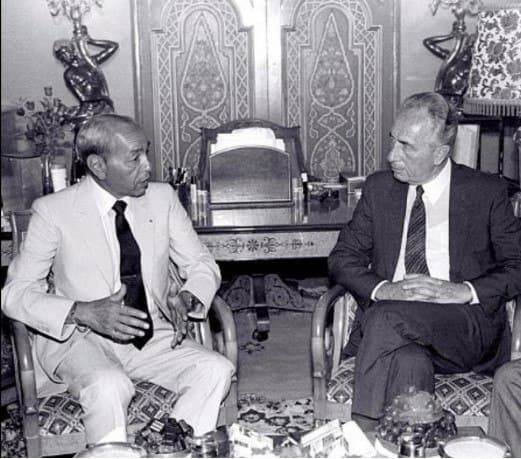One Year of Normalization between “Israel” and Morocco: Remembering the Old Love Story!
This Moroccan dash towards normalization with "Israel" is not surprising to those who know the old love story between Hassan II, the father of the current king, and “Israel”, which dates back to more than 60 years ago.
-

One Year of Normalization between “Israel” and Morocco: Remembering the Old Love Story!
A year ago, the normalization agreement between Morocco and "Israel" was officially signed. After that, the relations between the two sides jumped in all directions, from the exchange of ambassadors, to tourism and flights, to exports and economic relations, to visits of high-level minsters, until it reached security and defense cooperation.
This Moroccan dash towards normalization with "Israel" is not surprising to those who know the old love story between Hassan II, the father of the current king, and “Israel”, which dates back to more than 60 years ago.
In Commemoration of...
On July 9th, 2020, the “'Israel' Speaks Arabic” Facebook page enumerated the honors that the “State of Israel” paid to commemorate Hassan II on the 91st anniversary of his birth, and wrote:
A monument was erected to his memory in “Petah Tikva” city.
His name was given to one of the main streets in the town of “Kiryat Ekron”.
A park was established to commemorate him in Ashdod city.
A walkway was built in his name in the city of “Kiryat Gat”.
Upon his death, “Israel” issued a postage stamp bearing his picture and with Arabic writing which read: His Majesty King Hassan II, King of Morocco.
-

The notorious Israeli postage stamp commemorating Hassan II
Long History of Secret Relations
These Israeli honors to Hassan II did not come out of the blue. The services he offered to "Israel” throughout the years cannot be summarized in just one or two articles. It is a long history of cooperation, coordination, and even alliance, dating back to the beginnings of his accession to the throne of the Kingdom of Morocco in 1961, when the young king found himself in a turbulent environment where communist and socialist revolutions were invading many parts of the world and national liberation movements continued nonstop in Africa, Asia and Latin America to get rid of the old colonialism along with its local affiliates of submissive monarchies, tribal rulers, and agents.
Next to him in Algeria was the great revolution against France at its height, which received unlimited support from the Nasser regime in Egypt, the enemy of all Arab monarchies. The threat to Hassan II was grave and the Moroccan people were not immune to the “revolutionary wave” whose storms were intensifying with the successive fall of the Arab monarchies from Egypt to Iraq to Yemen.
Hassan II turned his eyes to the east to find "Israel", the pariah, bastard state forcibly planted in the region, which is completely hostile to all revolutionary movements, progressive regimes, Arab nationalist parties and left organizations in the region.
Hassan II saw in "Israel" a potential ally that could be trusted and relied upon when needed.
The Israeli temptation was great, especially with the young king’s knowledge of the Jewish state’s high status in the major countries in the West, which could facilitate matters and open closed doors for him to reach decision-making centers in Paris, London and Washington, which are, in his view, the strongest and best guarantee of his rule and throne.
Hassan II wasted no time. Between 1961 and 1964, he began working with "Israel" secretly, helping it to displace and transfer 97,000 Moroccan Jews - through Europe - to occupied Palestine (the immigration of Moroccan Jews to "Israel" had stopped in 1956). And in 1965 he made a deal with it, allowing the Israeli Mossad to spy on the Arab summit conference that was hosted by him in Morocco and to record all the deliberations and discussions, including the secret and closed ones. In return, the Mossad helped him track down, kidnap and kill the most prominent and dangerous Moroccan opponent, Mehdi Ben Barka, in Paris.
Despite the close secret relations that Hassan II had with "Israel", he, with his innate intelligence, did not lose sight of the importance of appearing before his people as a supporter of the Arab right in Palestine. Thus, he took the decision to send two infantry brigades that included dozens of soldiers, one to the Egyptian front and one to the Syrian front, to participate in the war of October 1973 against “Israel”. Furthermore, he repeatedly spoke publicly about Al-Aqsa Mosque in occupied Al-Quds and displayed his concern as the Commander of the Muslim Faithful (the title that he gave to himself) regarding its status and safety. When the Organization of the Islamic Conference established the “Al-Quds Committee” in 1975, its chairmanship was entrusted to Hassan II.
Hassan II played an important role in bringing Egypt and "Israel" closer by facilitating and encouraging secret contacts between the two parties. When Anwar Al-Sadat began his preparations for the “peace journey”, he could not find a better friend than the king to help him convey his ideas to “Israel” and communicate with its leaders. Indeed, Hassan II arranged the most important secret meeting that took place prior to Sadat's visit to Al-Quds in 1977 between the Israeli Foreign Minister, Moshe Dayan, and Sadat's close advisor, Hassan Al-Tohamy, when they met in Morocco under the king’s sponsorship.
Then Came the Public Contacts
In the eighties of the last century, Hassan II considered that the time had come and the conditions were ripe to uncover his relationship with "Israel" and to break more "psychological barriers" between the Arabs and "Israel". In 1986, he received the Israeli Prime Minister at his palace in Rabat, and the King allowed news about that visit and the meeting he had with Shimon Peres* to be published. On that day, the Moroccan media said that the meeting took place “in order to support the Palestinian people”.
In 1990 Hassan II appointed Andre Azoulay, a highly educated French-Moroccan Jew, as his special adviser. Azoulay remained close to the king, constantly giving him "advice" until he died in 1999. Azoulay was among the "legacy" that Mohammed VI inherited and he is still with him to this day. "Israel" sent a huge delegation that included 200 officials to participate in his funeral and offer condolences on his death.
And it’s no wonder the son follows father’s footsteps.
P.S*:
One of the anecdotes of the Arab summit that was held in Algeria in 1988 was that Colonel Gaddafi wore white gloves on his hands. when asked about the reason, he said that he did not want his hand to touch the hand of the person who shook hands with the criminal, Arab killer, Shimon Peres, in case he had to shake hands with Hassan II.

 Hussam AbdelKareem
Hussam AbdelKareem
 6 Min Read
6 Min Read











